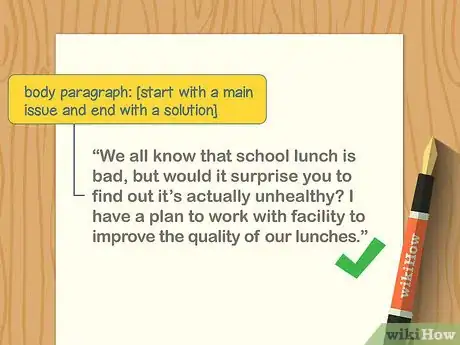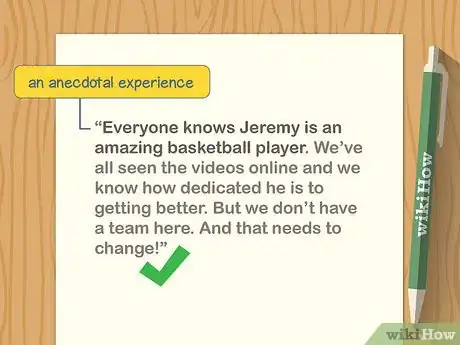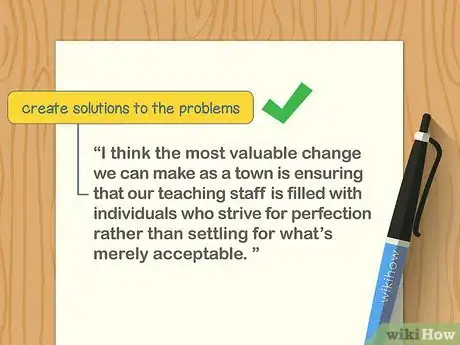This article was co-authored by Patrick Muñoz. Patrick is an internationally recognized Voice & Speech Coach, focusing on public speaking, vocal power, accent and dialects, accent reduction, voiceover, acting and speech therapy. He has worked with clients such as Penelope Cruz, Eva Longoria, and Roselyn Sanchez. He was voted LA's Favorite Voice and Dialect Coach by BACKSTAGE, is the voice and speech coach for Disney and Turner Classic Movies, and is a member of Voice and Speech Trainers Association.
There are 13 references cited in this article, which can be found at the bottom of the page.
This article has been viewed 435,503 times.
If you possess leadership skills and want to make a change, you may want to run for office.To become an elected official, you must convince voters that you’re the best option by delivering a message that will win them over. Regardless of whether your goal is a seat in Congress or a position as school president, the basic principles remain the same when making an election speech.
Steps
Structuring Your Points into a Speech
-
1Use a conversational tone in your speech.[1] Keeping your speech simple and conversational will help it reach the maximum amount of potential voters and will prevent people from not understanding your points or tuning you out. Avoid using long words that are hard to pronounce or sentences that are overly complex just to sound smart. This will prevent you from stumbling on your words when you deliver the speech.[2]
- You should write the speech with phrases and words that you normally use when talking to people.
- For example, don’t write something like, “Voters and citizens, the abhorrent nature of my opponent while he assumed the position as treasurer saw that governmental coffers were drained to their lowest point in a decade!”
- Instead, write something like, “Can you really trust my opponent? When he was treasurer so much money went missing that we’re now at the lowest level in 10 years!”
-
2Write an introduction. The intro should get the listener’s attention and describe what the rest of the speech is going to be about.[3] State the main points, issues, and solutions towards the beginning of the speech so that the voters can follow you as you give the speech. Limit the number of issues you’ll be talking about to two or three so that you can keep the listener's attention.[4]
- If you’re running for school president you can say something like, “Hey everyone. Today I’ll be talking about the important things that everyone here cares about, like the quality of our lunch, access to sports, and lack of programs and what faculty can do to fix it.”
- If you're running for city council or mayor, you can say something like, “Thank you to everyone who decided to come. Today I’ll be talking about how essential educational investment is and what we can do about bringing jobs and industry back to our town.”
Advertisement -
3Create a paragraph for each point you want to make. Start the paragraph by stating the issue and end the paragraph with the solution. Each point in the speech should be set up as an issue or problem facing the voters and how you'll provide the solution. Make a separate paragraph for each issue that you want to talk about in your speech.[5]
- If you're running for school president your paragraph could start something like "We all know that school lunch is bad, but would it surprise you to find out it's actually unhealthy? I have a plan to work with facility to improve the quality of our lunches."
- If you're running for a federal office, you could write "There are many issues that face us today, but one of the most important things right now is access to healthcare. My plan for a single-payer system will ensure that everyone, regardless of income, will be able to afford high-quality health services in our state. I believe that healthcare is a human right, not a privilege."
- Jumping from point to point will only confuse the listeners.
- You don’t always have to stick to this structure but it's what usually works best and will keep your speech organized.
-
4Use an anecdotal experience to tell a story. Keep the listeners engaged by telling a story. Use a story that will help explain your main points, like an experience you had or a story a concerned voter told you. Think of something impactful and emotional that relates to what you want to say and use that to present your points.[6]
- For instance, if you are running for school president you could say something like, "Everyone knows Jeremy is an amazing basketball player. We've all seen the videos online and we know how dedicated he is to getting better. But we don't have a team here. And that needs to change!"
- For instance, if you’re talking about increasing the minimum wage, you could say something like, “I know a girl in my district named Gabby who is a single mother without her high school diploma. She’s one of the hardest workers and most genuine people I have ever met, but she is on government assistance because the only job she can get will only pay $8 an hour. This is just not an income that can sustain any sort of family, and it’s up to us to make sure that corporations reward workers who put in the effort and do the right thing. That’s why I’m proposing a major increase of the minimum wage over the next 5 years to $15 per hour.”
-
5Be as concise as possible. Avoid going off-topic and stay on your main points when writing the speech.[7] Tangents can bore or confuse the audience and could even muddle what you’re trying to say. Don’t be afraid to cut out any words, phrases, and even entire paragraphs that aren’t necessary for your speech. [8]
- For example, if you’re mainly campaigning on environmental justice and immigration reform, don’t talk about foreign relations or prison justice reform in your speech because it will make the speech long-winded and off topic.
-
6End the speech with a conclusion and a call to action. The conclusion should summarize and wrap everything up so that your main stances are clear. The conclusion is also a great place to give the audience a call to action, or something actionable that they can do to improve their situations. Typically for an election speech, that means getting out to the polls to cast their vote.[9]
- If you're running for office in school, you could say something like "We've talked about the lack of resources, unhealthy lunch food, and lack of decorations at the dances. And I've also layed out every way we can solve these problems together. If you want to do better for Freemondt Highschool, vote for me on November 8th!"
- For instance, you could say, “And if you vote for my opponent, nothing will change! That’s why on November 5th, you should vote for me.
-
7Proofread the speech. Read the speech out loud and catch any errors in spelling, grammar, or punctuation. Give the speech to someone you know so that they can proofread it as well. If you’re including statistics or facts, double-check to make sure that everything is correct before creating a final draft of your speech. You can also shorten your speech or add components that you think may be missing.[10]
- If you’re talking about a foreign country or including the names of people in your speech, make sure you know how to pronounce them correctly.
Delivering the Message
-
1Practice delivering the speech before you give it. The more that you practice giving it, the more natural you’ll feel saying the words. Try to memorize parts of the speech that require extra emphasis or power.[11] If you stumble on your words, go over the part that you messed up several times so that you don’t mess up when you deliver the real thing. Get someone to watch you deliver the speech, and ask for feedback.[12]
- You can ask your friend whether they thought the speech was moving or powerful, if they were bored, or if there was anything they didn’t understand.
- You can also memorize the speech so that you don’t have to read it when you’re delivering it. If you practice enough, you many naturally memorize parts of the speech.
-
2Stand up straight and convey confident body language. Make eye contact with different people in the audience to connect with them on a deeper level. Lift your chin and straighten your back so that you can project your voice and give off a sense of confidence. Use large, steady strides when walking up to the podium so that you don’t come off as flustered or nervous.[13]
-
3Speak loudly and decide on which tone of voice you want to use. Pick a tone of voice that already matches what your voice sounds like. For instance, if you’re soft-spoken, you can try to come off as friendly and personable. If you have a loud, defined voice, you can try to come off as confident and in command.[14]
- When speaking in public, it’s important that you project your voice so everyone in the room can hear you. This is why you should generally speak louder than you normally do.[15]
-
4Pace yourself and pause to make important points.[16] Make sure you breathe and take your time when delivering the speech. If you talk too fast, people will miss what you’re saying and you may come off as nervous and unsure of yourself. Pause before you say a main point to make it stick out in people’s minds.[17]
- Often, people will think that they are speaking much quicker than they really are.
- Former U.S. President Barack Obama used pauses to emphasize points in his speeches frequently.
Creating a Platform
-
1Determine who your potential voters are. Research your voter's age, economic status, and average education level. Talk to your voters and ask them and get to know them. Knowing the type of people who are voting will help you to better determine the issues and problems that concern them the most.[18]
- Information about your voters can also be gained by reviewing polling information, past voter data, or by considering the location where you're giving the speech.
- If you're delivering the speech at a university, there's a high likelihood most of the audience will be college-aged people.
- Stay away from saying anything that may offend or upset your potential supporters.
-
2Identify problems or issues facing your voters. Talk to your voters and ask them about what matters to them to get a better idea about what they care about. Incorporate the issues that matter to your constituency into your speech. If you’re running for student class president, you could be running to provide greater access to sports and art programs at the school.
- For instance, voters could be concerned about corruption or a lack of jobs.
- You can also ask people about their biggest concerns on social media.
-
3Create solutions to the problems you identified. Create a plan and strategy to solve the issues that you've identified. Think of creative solutions to issues that have been inconveniencing voters for a long time and write them down. Then you can generate solutions that your voters will support.[19]
- If there are not enough programs at your school, you could talk to the administration and the student body to develop new programs in your school.
- For instance, if there is a lack of jobs in your town, you could propose a plan to lower the corporate tax rate in your area to bring in new business.
Expert Q&A
Did you know you can get expert answers for this article?
Unlock expert answers by supporting wikiHow
-
QuestionHow do you perform a speech?
 Patrick MuñozPatrick is an internationally recognized Voice & Speech Coach, focusing on public speaking, vocal power, accent and dialects, accent reduction, voiceover, acting and speech therapy. He has worked with clients such as Penelope Cruz, Eva Longoria, and Roselyn Sanchez. He was voted LA's Favorite Voice and Dialect Coach by BACKSTAGE, is the voice and speech coach for Disney and Turner Classic Movies, and is a member of Voice and Speech Trainers Association.
Patrick MuñozPatrick is an internationally recognized Voice & Speech Coach, focusing on public speaking, vocal power, accent and dialects, accent reduction, voiceover, acting and speech therapy. He has worked with clients such as Penelope Cruz, Eva Longoria, and Roselyn Sanchez. He was voted LA's Favorite Voice and Dialect Coach by BACKSTAGE, is the voice and speech coach for Disney and Turner Classic Movies, and is a member of Voice and Speech Trainers Association.
Voice & Speech Coach
-
QuestionHow do we inject a little humour to the speech? My school loves jokes.
 GEttingerCommunity AnswerTalk about an issue or teacher in your school in a humorous way. For instance, you could say something like, "We all love having to share books in Ms. Clever's class, but honestly, we can do better than that, can't we?" or you can say, "The Tuesday mystery meat might be delicious for my dog, but I'm pretty sure no human would ever want to consume it. That's why if you vote for me, I'll make it my mission to improve school lunch."
GEttingerCommunity AnswerTalk about an issue or teacher in your school in a humorous way. For instance, you could say something like, "We all love having to share books in Ms. Clever's class, but honestly, we can do better than that, can't we?" or you can say, "The Tuesday mystery meat might be delicious for my dog, but I'm pretty sure no human would ever want to consume it. That's why if you vote for me, I'll make it my mission to improve school lunch." -
QuestionWhat can I do to demonstrate that I am a good and efficient leader?
 GEttingerCommunity AnswerYou can talk about prior instances where you excelled leading a group of people. Frame it in a compelling story to really catch the attention of people listening.
GEttingerCommunity AnswerYou can talk about prior instances where you excelled leading a group of people. Frame it in a compelling story to really catch the attention of people listening.
References
- ↑ Patrick Muñoz. Voice & Speech Coach. Expert Interview. 12 November 2019.
- ↑ https://open.lib.umn.edu/publicspeaking/chapter/14-1-four-methods-of-delivery/
- ↑ Patrick Muñoz. Voice & Speech Coach. Expert Interview. 12 November 2019.
- ↑ https://www.unr.edu/writing-speaking-center/student-resources/writing-speaking-resources/speech-introductions
- ↑ https://courses.lumenlearning.com/publicspeakingprinciples/chapter/chapter-8-outlining-your-speech/
- ↑ https://www.unr.edu/writing-speaking-center/student-resources/writing-speaking-resources/speech-evidence/
- ↑ Patrick Muñoz. Voice & Speech Coach. Expert Interview. 12 November 2019.
- ↑ https://owl.purdue.edu/owl/general_writing/academic_writing/conciseness/index.html
- ↑ https://www.indeed.com/career-advice/career-development/how-to-write-motivational-speech
- ↑ https://writingcenter.unc.edu/tips-and-tools/editing-and-proofreading/
- ↑ Patrick Muñoz. Voice & Speech Coach. Expert Interview. 12 November 2019.
- ↑ https://professional.dce.harvard.edu/blog/10-tips-for-improving-your-public-speaking-skills/
- ↑ https://sps.columbia.edu/news/five-ways-improve-your-body-language-during-speech
- ↑ https://www.ndi.org/sites/default/files/Module%207_Becoming%20a%20Powerful%20Communicator_EN.pdf
- ↑ Patrick Muñoz. Voice & Speech Coach. Expert Interview. 12 November 2019.
- ↑ Patrick Muñoz. Voice & Speech Coach. Expert Interview. 12 November 2019.
- ↑ https://www.ndi.org/sites/default/files/Module%207_Becoming%20a%20Powerful%20Communicator_EN.pdf
- ↑ https://www.ndi.org/sites/default/files/Political_Campaign_Planning_Manual_Malaysia_0.pdf
- ↑ https://www.psychologytoday.com/us/articles/202004/how-win-election












































































